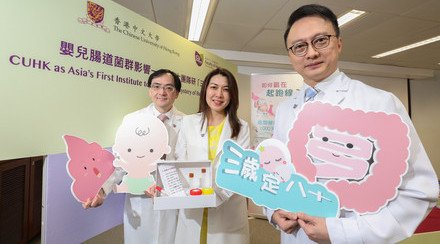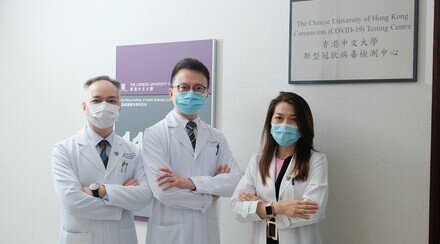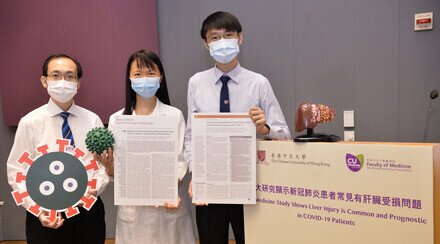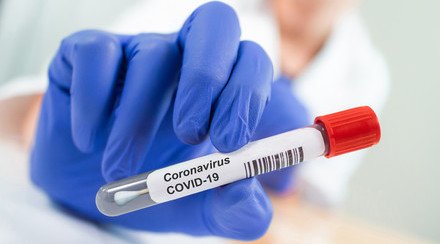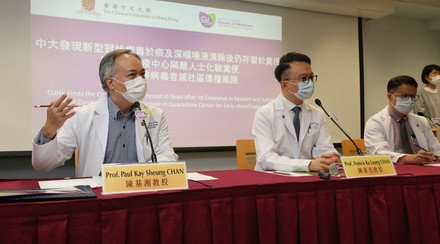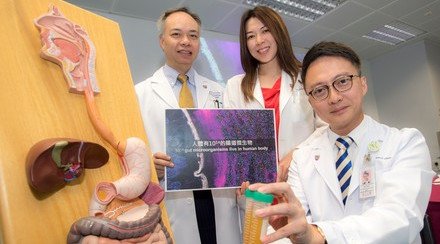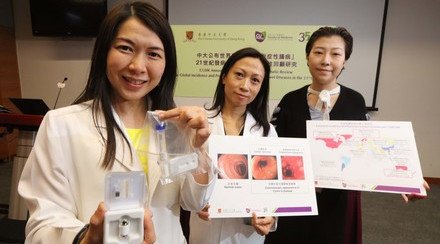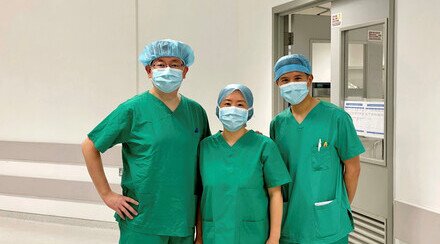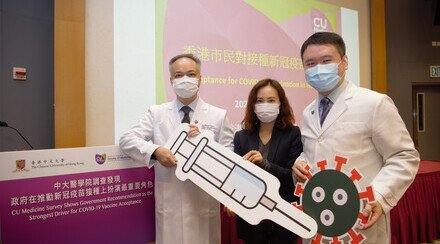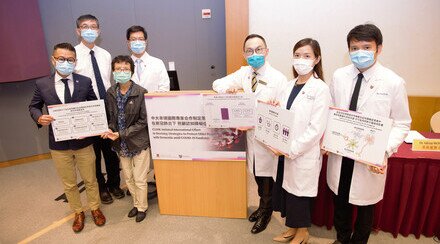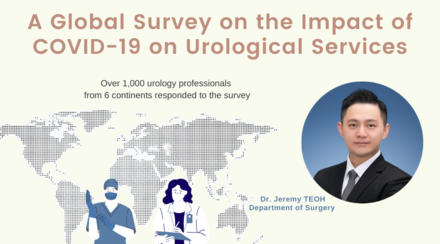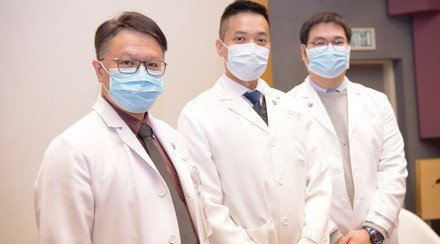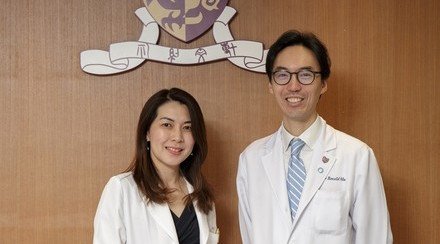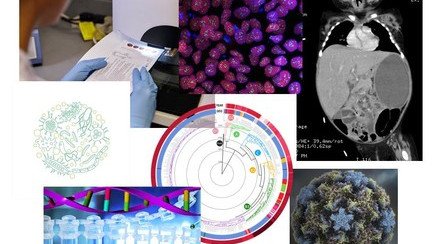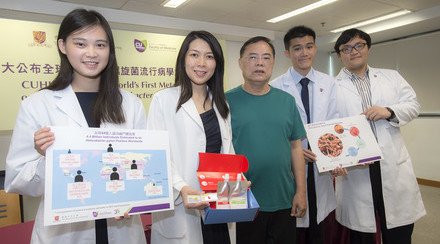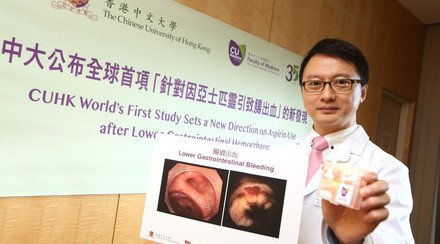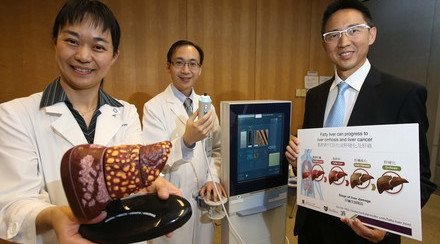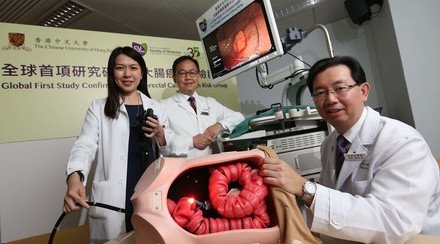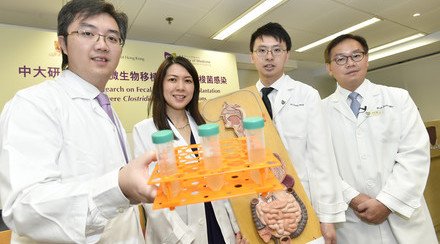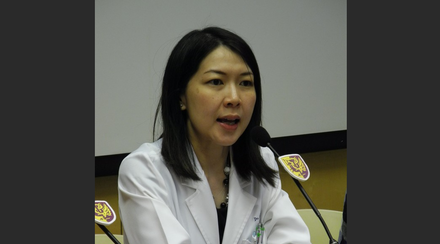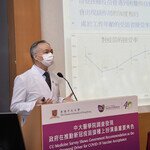CU Medicine Finds New Evidence for Link between Gut Microbiome and COVID-19 Severity Microbiome Imbalance Might Influence “Long COVID” Risk
A recent study by the Faculty of Medicine at The Chinese University of Hong Kong (CU Medicine) discovered that composition of gut microorganisms (microbiota) in COVID-19 patients is very different from uninfected individuals and is linked to disease severity. COVID-19 patients lack certain good bacteria known to regulate their immune system and the abnormal gut microbiota (dysbiosis) persists after clearance of the virus, which could contribute to lingering symptoms, known as “Long COVID”. The study results suggest gut microbiome may influence the severity of COVID-19 as well as the magnitude of the immune response to the infection. Clinical management not only should aim at clearing the virus but also restoring the abnormal gut microbiota. The findings have been published in the international journal Gut and its global press release.
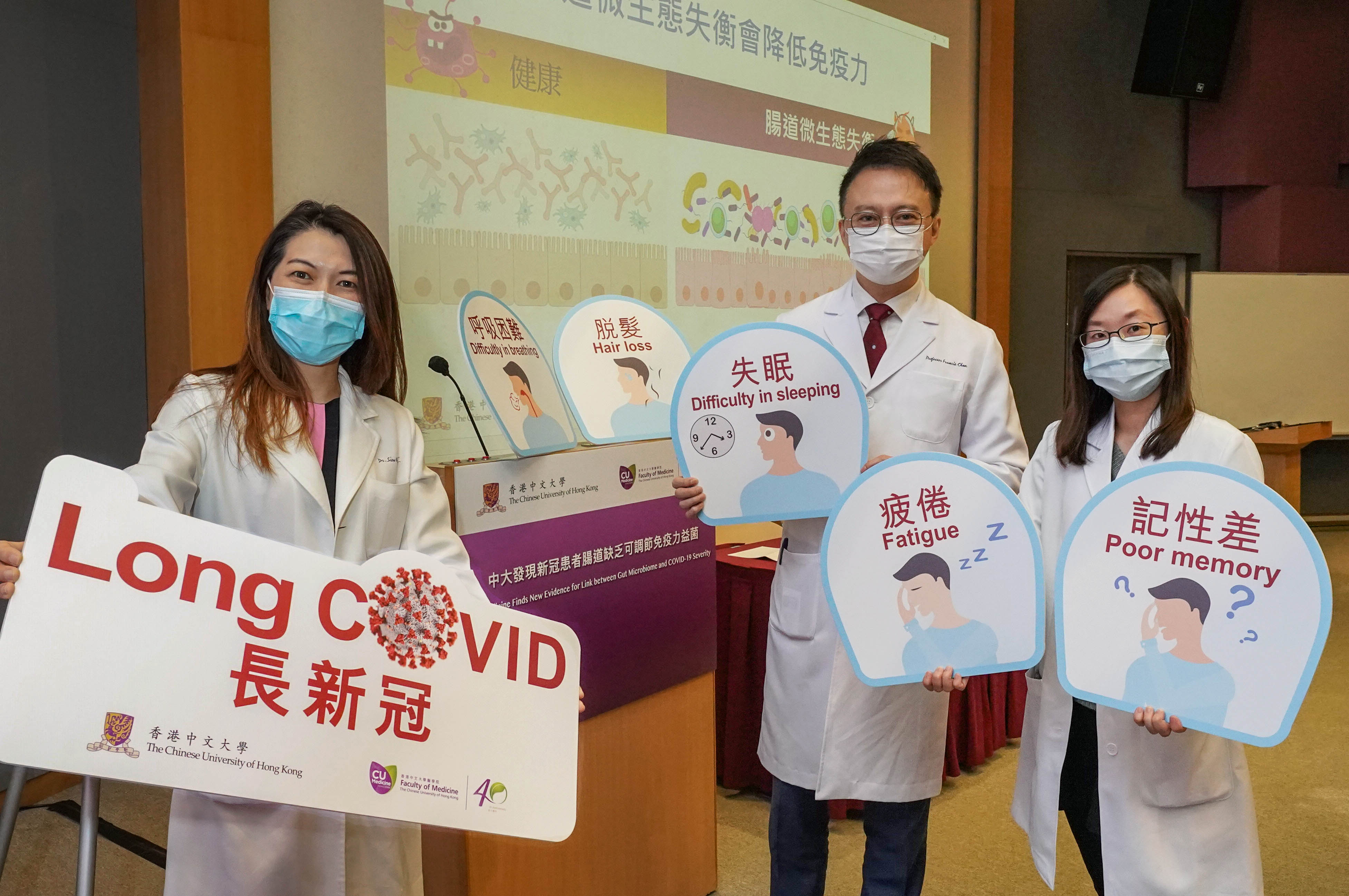
A recent study conducted by CU Medicine discovered that gut microbiota in COVID-19 patients links to disease severity. COVID-19 patients lack certain good bacteria known to regulate their immune system and the abnormal gut microbiota persists after clearance of the virus, which could contribute to lingering symptoms, known as “Long COVID”. The most common symptoms are fatigue, poor memory, difficulty in sleeping, breathlessness and hair loss.
(From left) Professor Siew NG, Associate Director of the Centre for Gut Microbiota Research; Professor Francis CHAN, Dean of Medicine and Director of the Centre for Gut Microbiota Research, at CUHK ; and Dr. Joyce MAK, Assistant Professor of the Division of Gastroenterology and Hepatology at CU Medicine.
80% of COVID-19 Patients in Hong Kong Suffer from “Long COVID”
“Long COVID”, known as post-COVID syndrome, are signs and symptoms that develop during or following an infection including COVID-19 which continue for more than 12 weeks and are not explained by an alternative diagnosis. The five most common symptoms are fatigue, poor memory, difficulty in sleeping, breathlessness and hair loss.
CU Medicine followed up 30 COVID-19 patients in Hong Kong and found that 80% of patients had at least one persistent symptom at six months after infection and one-third of the patients had more than three symptoms at six months.

Professor Francis Chan states that it is alarming to find 80% of COVID-19 patients suffer from “Long COVID” for more than six months. The findings underscore the importance to restore gut dysbiosis to boost immunity against the virus and hasten recovery.
Professor Francis KL CHAN, Dean of Medicine and Director of the Centre for Gut Microbiota Research at CUHK remarked, “Gut microbiota regulates our immune system and an imbalance will generate health issues. While the long-term health consequences of COVID-19 remain unclear, it is alarming to find that 80% of COVID-19 patients suffer from ‘long COVID’ for more than six months. Our new findings of persistent dysbiosis in recovered COVID-19 patients highlight that gut microbiota imbalance with impaired immunity could play a role in ‘long COVID’. Our earlier study also showed that 40% of Hong Kong people had significant gut dysbiosis comparable to that of COVID-19 patients, it is crucial to restore dysbiosis to boost our immunity against the virus and to hasten recovery.”
Bolstering Beneficial Gut Species Could Mitigate During and After COVID-19
To understand if gut microbiome might affect immune system response to COVID-19 infection, CU Medicine researchers collected blood and stool samples, as well as clinical data, from 100 people admitted to hospitals with laboratory-confirmed COVID-19 between February and May 2020. To characterise the gut microbiome, 41 of the COVID-19 patients provided multiple stool samples while in hospital, 27 provided serial stool samples up to 30 days after clearance of SARS-CoV-2. Levels of inflammatory cytokines and blood markers were measured from plasma. The data were compared with samples from 78 people without COVID-19.
Below are the major findings:
- Composition of the gut microbiota in COVID-19 patients is concordant with disease severity.
- Gut dysbiosis is cosely associated with the magnitude of plasma concentrations of several inflammatory cytokines, chemokines and blood markers of tissue damage.
- Patients had higher numbers of “bad bacteria” including Ruminococcus gnavus, Ruminococcus torques and Bateroides dorei species than people without the infection.
- COVID-19 patients had less “good bacteria” that can influence immune system response, such as Faecaibacterium prausnitzii, Eubacterium rectae and Bifidobacterium adoescentis. Lower numbers of good bacteria F. prausnitzii and Bifidobacterium bifidum were associated with infection severity.
- The numbers of the “good bacteria” remained ow in samples collected up to 30 days after infected patients had cleared the virus from their bodies.
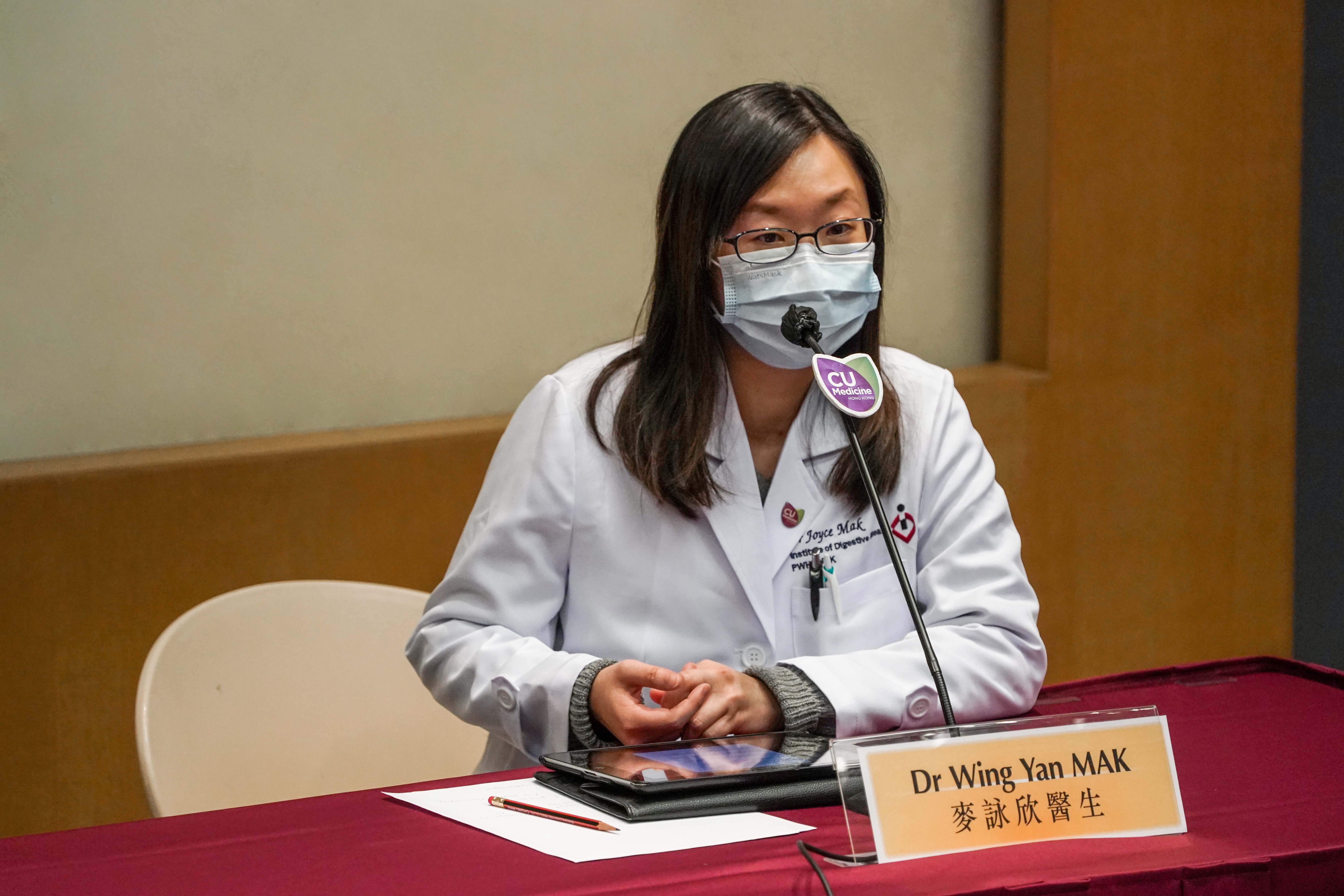
Dr Joyce Mak remarks that a subset of recovered patients with COVID-19 experience persistent symptoms, some over six months after initial onset of symptoms. The research team posits that the dysbiotic gut microbiome may not only contribute to disease severity and excessive inflammatory cytokine, but also lead to immune-related health problems post-COVID-19.
Dr. Joyce Wing Yan MAK, Assistant Professor of the Division of Gastroenterology and Hepatology at the Department of Medicine and Therapeutics, CU Medicine elaborated, “In this study, we found that stratification of gut microbiota composition is associated with immune response to COVID-19 and subsequent tissue damage, which means it may contribute to disease severity and excessive inflammatory cytokine. Given that a subset of recovered patients with COVID-19 experience persistent symptoms such as fatigue, poor memory, difficulty in sleeping, breathlessness and hair loss, some over six months after initial onset of symptoms, we posit that the dysbiotic gut microbiome could contribute to immune-related health problems post-COVID-19.”
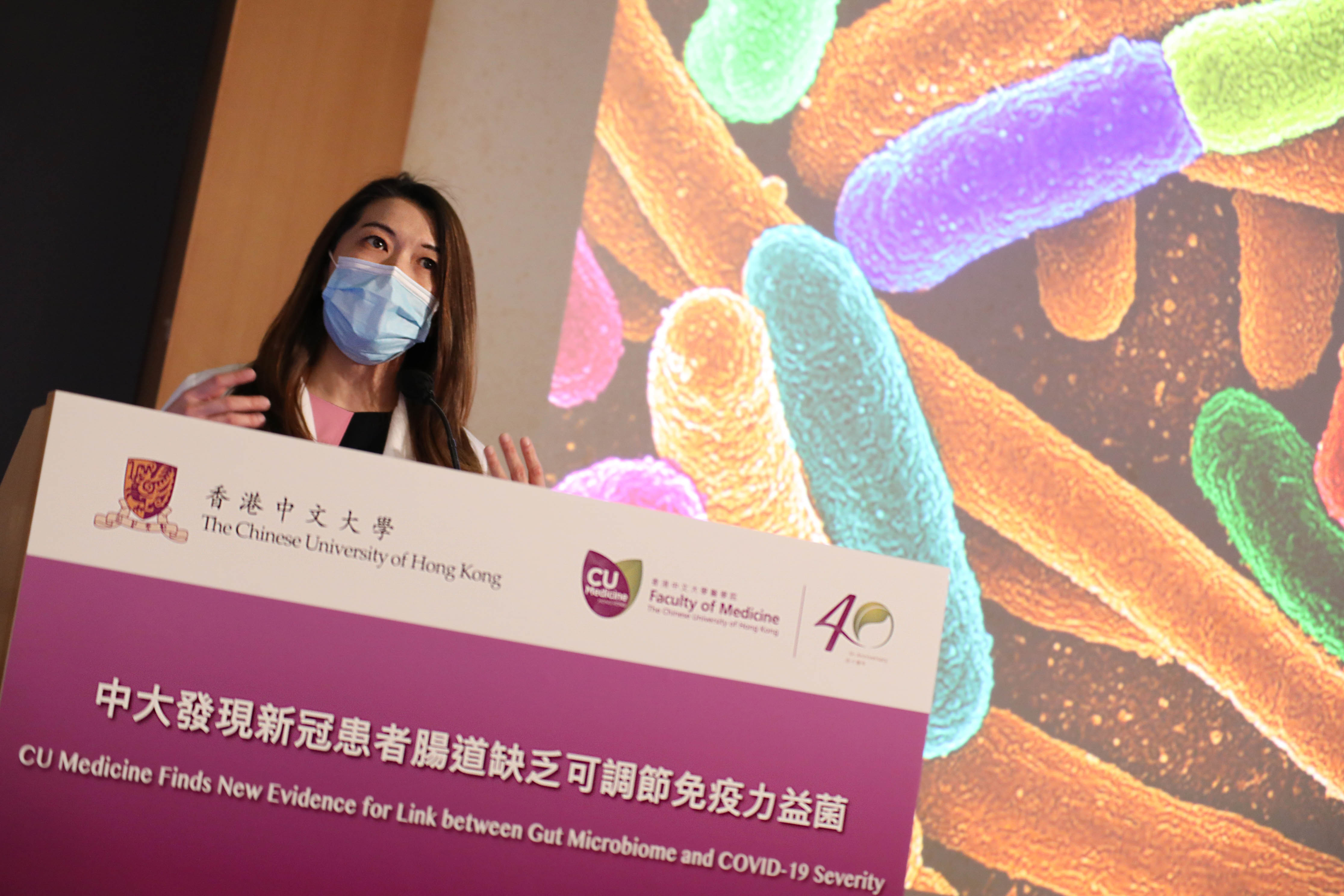
Professor Siew Ng believes bolstering of beneficial gut species depleted in COVID-19 could serve as a novel avenue to mitigate severe disease, and the research team is studying whether restoration of microbiome balance could reduce risk of “Long COVID”.
Professor Siew Chien NG, Associate Director of the Centre for Gut Microbiota Research at CUHK concluded, “Dysbiosis is linked to the severity of COVID-19 and, if persists after viral clearance, could contribute to persistent symptoms and/or multisystem inflammation syndromes (i.e., long COVID syndrome). Restoration of dysbiosis offers hope to boost our immunity against SARS-CoV2 and hastens recovery from the disease. We believe bolstering of beneficial gut species depleted in COVID-19 could serve as a novel avenue to mitigate severe disease, before and after the infection, and we are studying whether restoration of microbiome balance could reduce risk of ‘Long COVID’.”



